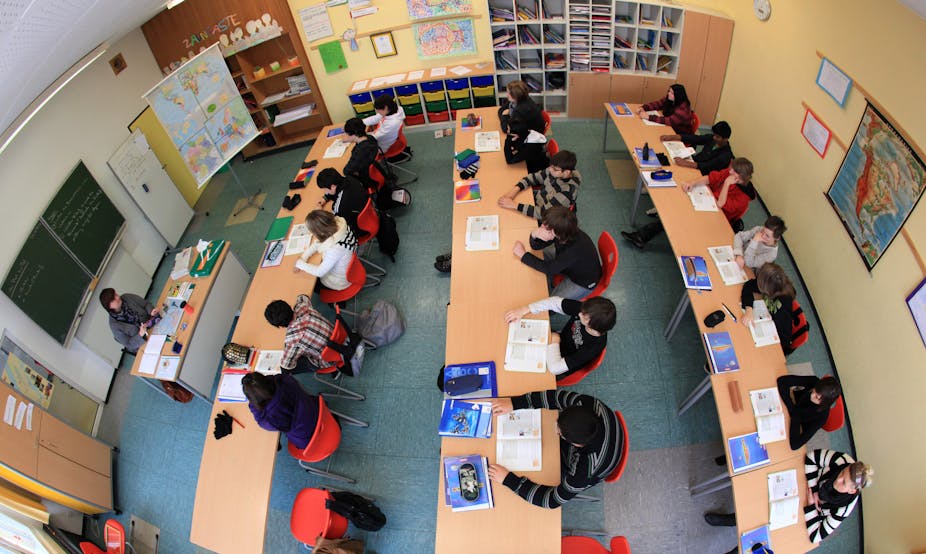The question about how to inspect UK schools has become a live political issue in recent months. As the fallout from the Trojan Horse affair over the protection of children from religious extremism in some Birmingham schools rumbles on, Ofsted, England’s schools inspectorate, is coming under increasing pressure to reform the way it monitors what goes in classrooms.
But England is just one of a number of countries that are intensifying their inspection processes. Recent studies into school inspection across Europe reveal that even though inspectorates are hoping for the same outcomes, they are adopting very different approaches in governing education.
One of Europe’s most punitive systems
These range from systems that focus on regulation and compliance, such as Sweden; to those taking a more developmental approach, such as Scotland, which largely relies on school self-evaluation to monitor progress. Developmental inspections can also be found in Germany, where assessments result in target agreements on school improvement which form the entry points of follow-up inspection visits.
Countries also differ in how much they use “non-punitive” methods including persuasion, feedback and support to motivate school improvement. Austria and Switzerland largely opt for this option. Others countries are seen as being more punitive, using sanctions such as school closure, warning letters, and reconstitution of schools to enforce improvement and compliance.
England is one of the only countries in Europe that combines a hard regulatory approach with a developmental one. It also has the reputation of being one of the most punitive regimes in terms of the powers that Ofsted has to close schools down and the fear that it has traditionally instilled in those undergoing an Ofsted inspection.
England also stands out for its system of sub-contracting inspections out to private companies (Serco, Tribal and CfBT). Now the head of Ofsted Michael Wilshaw has announced that due to numerous complaints of inconsistency in the regime, this will come to an end when the contracts expire in 2015. How the agency intends to resolve the massive shortfall in staff that this change will provoke and all by September 2015, is yet to be seen.
What works
One ongoing study into European inspection involves research teams from eight European countries including England, Ireland, Sweden and the Netherlands. They are examining how inspection promotes good education for all pupils and student achievement in schools. So far, the study has revealed that although countries differ in a number of aspects, as described above, there are some important points that pull up school standards.
The clearer schools are about how an inspection will be conducted, the standards used to evaluate school and teaching quality, and the methods of assessment, the greater the chance that the inspection will lead to school improvement. Examples of such “norm-setting” of inspections can be found in England and the Netherlands, where schools use examples of good practice, published by the inspectorates, to inform their self-evaluations, leadership and teaching.
The way schools evaluate their own strengths and weaknesses has been highlighted as being key to the creation of the “self-improving school”. The extent to which parents, school governors and students are sensitive to the findings of inspections and place pressure on the school to act on them, is also an important factor, linking strongly to schools’ acceptance of feedback and inspection standards.
Further statistical modelling by the researchers has indicated that those inspectorates (such as England and the Netherlands) that evaluate both the educational practices and outcomes of a school and then publicly report their findings for individual schools, lead to the most effective improvements in schools’ self-evaluation. But this has a downside too, producing unintended consequences that result in a narrowing of the curriculum and discouragement of risk taking and innovation by teachers.
But school inspection is multi-faceted and its desired effects not purely confined to school improvement. A recent project called governing by inspection led by Oxford’s Jenny Ozga and teams of researchers from Scotland, England and Sweden, has investigated the ways that governments use inspection to govern increasingly complex education systems.
Taking three very diverse systems of inspection, the project has revealed the powerful political, historical, social and economic factors that influence inspectors’ judgements. In addition it revealed the very different emphases placed on elements such as teacher observation,what counts as evidence, compliance and communication with parents and how this affects the recruitment and training of inspectors.
A recent paper comparing the recruitment and training of inspectors in England and Sweden highlighted the sharp contrast between the two inspection systems. England, with its system of intensive teacher observation, has recently re-modelled the inspection workforce in order to include acting headteachers from outstanding schools. Meanwhile, Sweden changed its policy of recruiting inspectors from an education background to a policy emphasising the recruitment of legal professionals and those with a background in research and proven investigative skills.
Both policies were introduced to counter criticisms, but since they were introduced both inspectorates have been subject to different accusations: Swedish inspectors accused of being too far removed from education, and English inspectors the opposite.
Lessons after Trojan Horse
Returning to the current arguments raging over Ofsted’s role in the Trojan Horse affair, the insights from both projects are particularly timely. Inspection has assumed a very different mantle as a result of the crisis over extremism and it is more important than ever that school expectations of inspections are clear to both students and staff.
The elliptical soundbites and vituperative nature of the accusations against the schools involved in Trojan Horse leave the public anything but clear about the purpose of school inspection.
We can also learn from Europe about how inspection in England is being increasingly politicised. In most countries,including England, inspection systems were designed to be immune from undue political agendas and could be relied upon to provide a robust basis for parental school choice. We all have a lot to learn from each other about what works and what doesn’t when it comes to this influential, but contentious process.

